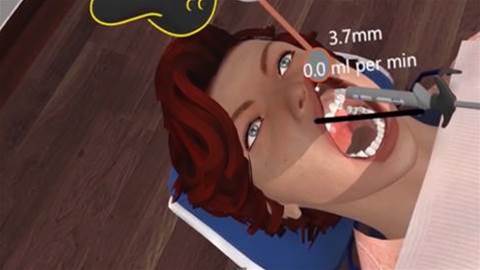Virtual reality is helping oral health students at the University of Newcastle (UON) steady their nerves when it comes administering injections before they get to try it out on real-world patients.

Second and third-year students have this semester been able to trial the delicate procedure of administering anaesthetic-filled needles into VR simulations before moving onto their peers and eventually patients.
Simulations on the Oculus headset can include injections to the roof of the mouth and interdental injections between the teeth, where the angle and depth of the needle need to be precisely controlled.
A virtual target point guides students to the ideal needle placement, and a virtual gauge displays the amount of anaesthetic being administered once the needle is in place.
Students also have the option of controlling the transparency of different layers of the test subject's anatomy, meaning they can see where the target nerves and blood vessels are in relation to the skin's surface, teeth and musculature.
It also gives teaching staff a controlled, standardised way to introduce students to common oral health scenarios, and allows the student's progress to be reviewed at any stage of the process.
The VR program is believed to be the first of its kind in the field, developed by the university's IT Services Innovation team and the School of Health Science's Denise Higgins, who lectures in oral health and coordinates the simulation trial.
Before the VR trial kicked off, students' only preparation for administering anaesthetic were lectures and video demonstrations before being put before real patients at the university's clinic, Higgins said.
"From listening to student feedback over the years, I knew they felt they were missing something between the theory and practising on their peers and patients.
"Administering anesthetic needles is an incredibly intricate process, and not something many feel confident doing without extensive practice. Ultimately, we want our patients to feel safe, comfortable and at ease, which is why it's crucial to ensure our students feel confident entering the patient clinic."
Higgins is also developing physical materials as part of her PhD in the field to simulate the feel of the injecting anaesthetic to support the virtual model.
The acting head of the discipline, associate professor Janet Wallace, added that students are more confident performing tasks at a safe level for themselves and for the patients.
"At the end of the day, our goal is to produce work-ready graduates who are going to perform at their best, and this is helping us do that."
This project has been named a finalist in the Emerging Technology category of the iTnews Benchmark Awards 2018/19.



_(33).jpg&h=140&w=231&c=1&s=0)

.png&h=140&w=231&c=1&s=0)





 iTnews Benchmark Awards 2026
iTnews Benchmark Awards 2026
 iTnews Executive Retreat - Security Leaders Edition
iTnews Executive Retreat - Security Leaders Edition
 iTnews Cloud Covered Breakfast Summit
iTnews Cloud Covered Breakfast Summit
 The 2026 iAwards
The 2026 iAwards












_(1).jpg&h=140&w=231&c=1&s=0)



